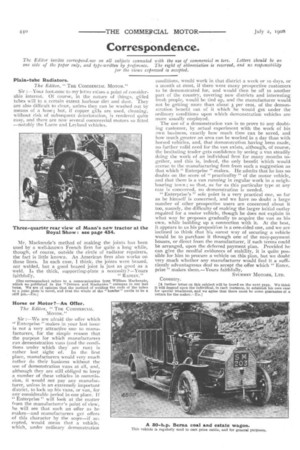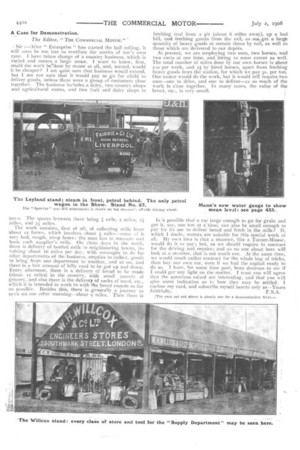Correspondence.
Page 26

Page 28

If you've noticed an error in this article please click here to report it so we can fix it.
The Edilor invites correspand.nce on all subjects connected ulth Me use of commercial m tors. Letters should be oss one side of the paper only, and type-written by preference. The right of abbreviation is reserved, and no responsibility for the views expressed is accepted.
Plain-tube Radiators.
The Editor, ‘• THE COMMERCIAL MOTOR."
Sir :—Your foot-note to my letter raises a point of considerable interest. Of course, in the nature of [hings, gilled tubes will to a• certain extent .harbour dirt and dust. They are also difficult to clean, unless they can be washed out by means of a hose; but, if copper gills are used, cleaning, without risk of subsequent deterioration, is rendered quite easy, and there are now several commercial motors so fitted —notably the Lacre and Leyland vehicles.
Mr. Mackenzie's method of making the joints has been used by a well-known French firm for quite a long while, though, of course, outside the circle of radiator repairers, the fact is little known. An American firm also works on these lines. In each case, I think, the joints were brazed, not welded, but a good brazed joint is just as good as a 'weld. h the thick, supporting-plate a necessity ?—Yours faithfully, " RADIAN."
[Our correspondent refers to a communication from William Mackenzie, which we published in the "Drivers and Mechanics" columns in our last issue. We are of opinion that the method of welding the ends of the tubes to a joint plate is novel, and that the whole of the " header" needs to be a stiff job.—ED.] Horse or Motor?—An Offer.
The Editor, " THE COMMERCIAL MOTOR."
Sir :—We are afraid the offer which " Enterprise " makes in your last issue is not a very attractive one to manufacturers, for the simple reason that the purpose for which manufacturers run demonstration vans (and the conditions under which they are run) is rather lost sight of. In the first place, manufacturers would very much rather do their business without the use of demonstration vans at all, and, although they are still obliged to keep a number of these vehicles in commission, it would not pay any manufacturer, unless in an extremely important district, to lock up his vans, or van, for any considerable period in one place. If " Enterprise'' will look at the matter from the manufacturer's point of view, he will see that such an offer as he makes—and manufacturers get offers of this character by the score—if accepted, would mean that a vehicle, which, under ordinary demonstration conditions, would work in that district a week or ro days, or a month at most, if there were many prospective customers to be demonstrated for, and would then be off to another part of the country, covering new districts and interesting fresh people, would be tied up, and the manufacturer would not be getting more than about 5 per cent, of the demonstration benefit out of it which he would get under the ordinary conditions upon which demonstration vehicles are more usually employed.
The use of a demonstration van is to prove to any doubting customer, by actual experiment with the work of his own business, exactly how much time can be saved, and how much greater an area can be worked in a day than with horsed vehicles, and, that demonstration having been made, no further valid need for the van exists, although, of course, the hesitating trader gets confidence by seeing a van steadily doing the work of an individual firm for many months together, and this is, indeed, the only benefit which would accrue to the manufacturing firm from such a suggestion as that which" Enterprise "makes. He admits that he has no doubts on the score of " practicality " of the motor vehicle, and that there is a van running in regular work in a neighbouring town ; so that, as far as this particular type at any rate is concerned, no demonstration is needed.
" Enterprise's " sole point is a very practical one, so far as he himself is concerned, and we have no doubt a large number of other prospective users are concerned about it too, namely, the difficulty of making the larger initial outlay required for a motor vehicle, though he does not explain in what way he proposes gradually to acquire the van as his own, while building up a connection with it. At the best, it appears to us his proposition is a one-sided one, and we are inclined to think that his surest way of securing a vehicle would be to purchase it through one of the easy-payment houses, or direct from the manufacturer, if such terms could be arranged, upon the deferred payment plan. Provided he can give the needful evidences of stability, it is quite possible for him to procure a vehicle on this plan, but we doubt very much whether any manufacturer would find it a suffi.. ciently advantageous deal to accept the offer which " Enter_ prise " makes them.—Yours faithfully,
STURMEY MOTORS, LTD. Coventry.
tA further letter on this subject will be found on the next page. We think it will depend upon the individual, in each instance, to establish his own case for special treatment, and we agree that there must he some guarantee of a return for the maker.—ED.]
A Case for Demonstration.
The Editor, "THE COMMERCIAL MOTOR."
Sir :—After " Enterprise " has started the ball roiling, it will soon be too late to ventilate the merits of one's own case. I have taken charge of a country business, which is varied and covers a large scope. I want to know, first, .could the work bedone by motor at all, and, Second, would it be cheaper? I am quite sure that business would extend, but I ant not sure that it would pay to go far afield to deliver goods, unless there were a group of customers close together. The business includes a dairy, two country shops and agricultural stores, and two fruit and dairy shops in town. The spaces between them being mile, 2 miles, 21 miles, and 21 miles.
The work consists, first of all, of collecting milk from about 12 farms, which involves about 5 miles—some of it very bad, rough, steep lanes: the man has to measure and book each supplier's milk. On three days in the week, there is delivery of bottled milk to neighbouring towns, involving about 16 miles per day, with messages to do for other departments of the business, empties to collect, goods to bring from one department to another, and so on, and there is a fair amount of hilly road to be got up and down. Every afternoon, there is a delivery of bread to be made (about 12 miles) in the country, with small parcels of grocery, and also there is the delivery of sacks of meal, etc., Which it is intended to work in with the bread rounds as far as possible. Besides this, there is generally a journey to town on'• one other morning—about 9 miles. Then there is
fetching coal from a pit (about 6 miles away), up a bad hill, 'and fetching goods from the rail, as-waLget a larg7e quantity of heavy goods at certain times by rail, as well as those which are delivered to our depots.
At present, we are employing two men, two horses, -and two carts at one time, and hiring to some extent as well. The total number of miles done by our own horses is about 210 per week, and 25 by hired horses,. apart from fetching heavy goods from the station, for which we pay 3s. per ton. One motor would do the work, but it would still require two men—onc. to drive, and one to deliver—as so mitch of the work is close together. In many cases, the value of the bread, etc., is very small.
Is it possible that a car large enough to go for grain and get it, say, one ton at f(thne, can also he small enough to pay for its use to deliver bread and fetch in the milk? If, which I doubt, motors are suitable for this special work at all. My own idea is that a steamer, like a Turner-Miesse, would do it to pay; but, as we should require to contract for the driving and repairs; and as no one about here will look at a steamer, that is not much use. At the same time, we would much rather contract for the whole bag of tricks, than buy our own car, even if we had the capital ready to do so. I have, for some time past, been desirous to see if I could get any light on the matter. I trust you will agree that the questions raised are interesting, and that you will give some indication as to how they may be settled. I enclose my card, and subscribe myself hereto only as—Yours faithfully, F.S.A. [The case set out above is clearly one for a demonstraticn
































